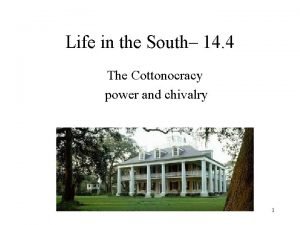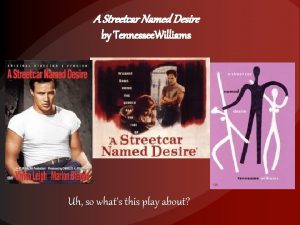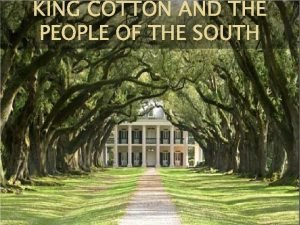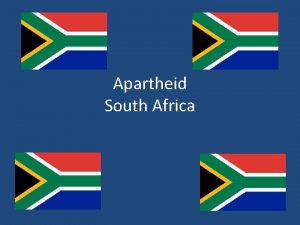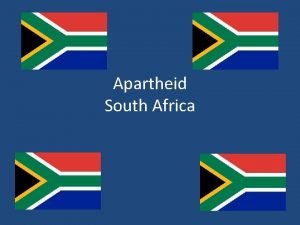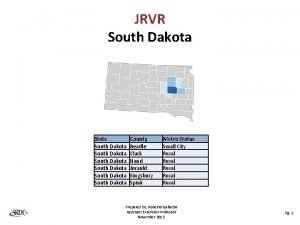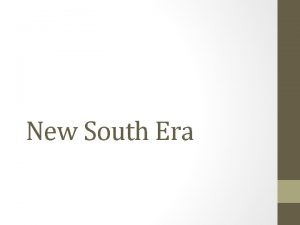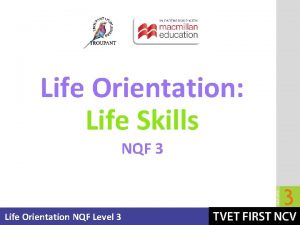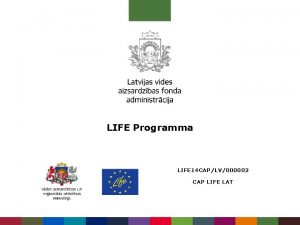Life in the South 14 4 The Cottonocracy












- Slides: 12

Life in the South– 14. 4 The Cottonocracy power and chivalry 1

The Cottonocracy • Planters - owned at least 20 slaves • Less than 1% owned more than 50 slaves • Only 8% owned more than 5 slaves 2

The Cottonocracy • Planters were very wealthy • Controlled economic and political life in the South • Built large expensive homes 3

Small Farmers Yeoman farmer • About 75 % were small farmers • Owned their own land • Owned few slaves if any • Yeoman farmers – worked the land 4

Poor Whites • Did not own their own land - Rented land • Lowest whites on social ladder Poor whites owned no land • Subsistence farming • Cattle – pigs - vegetables • Usually lived in upland regions 5

Free African Americans • 1860 – 200, 000 free blacks in South • Most in Maryland Delaware • New Orleans - Richmond • Faced discrimination • Slave Owners did not like having them around Free blacks set a bad precedent 6 in the South

Enslaved African Americans • About 1/3 of South’s population – about 3. 5 million • Most worked as field hands – women & children too • 12 -14 hours a day 7

Enslaved African Americans • Some – but very few were skilled • Some slave owners treated slaves reasonably well • Other were unreasonably cruel 8

Slave Codes • Local laws designed to keep slaves from escaping or rebelling • Limited places they could go without passes • Not educated – illiterate • Education was often illegal 9

Family Life & Religion • Families frequently broken up • Marriage not recognized in law • Might stay together on large plantations 10

Family Life & Religion • Many slaves find comfort in religion • African Americans had their own preachers 11

Slave Rebellions • Nat Turner – most famous in 1831 • Kills more than 57 whites in Virginia • Revolts were actually very rare • Most escapees were from Upper South Nat Turner 12
 Cottonocracy/planters
Cottonocracy/planters Old south vs new south streetcar named desire
Old south vs new south streetcar named desire End of life care in south tyneside
End of life care in south tyneside Cotton gin
Cotton gin Hình ảnh bộ gõ cơ thể búng tay
Hình ảnh bộ gõ cơ thể búng tay Frameset trong html5
Frameset trong html5 Bổ thể
Bổ thể Tỉ lệ cơ thể trẻ em
Tỉ lệ cơ thể trẻ em Gấu đi như thế nào
Gấu đi như thế nào Tư thế worms-breton
Tư thế worms-breton Hát lên người ơi alleluia
Hát lên người ơi alleluia Môn thể thao bắt đầu bằng chữ đua
Môn thể thao bắt đầu bằng chữ đua Thế nào là hệ số cao nhất
Thế nào là hệ số cao nhất
